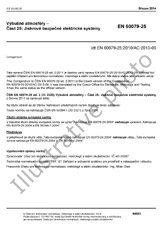We need your consent to use the individual data so that you can see information about your interests, among other things. Click "OK" to give your consent.

IEEE 1801-2018
IEEE Standard for Design and Verification of Low-Power, Energy-Aware Electronic Systems
Translate name
STANDARD published on 29.3.2019
The information about the standard:
Designation standards: IEEE 1801-2018
Publication date standards: 29.3.2019
SKU: NS-945125
The number of pages: 548
Approximate weight : 1675 g (3.69 lbs)
Country: International technical standard
Category: Technical standards IEEE
Annotation of standard text IEEE 1801-2018 :
Revision Standard - Superseded.
A method is provided for specifying power intent for an electronic design, for use in verification of the structure and behavior of the design in the context of a given power management architecture, and for driving implementation of that power-management architecture. The method supports incremental refinement of power intent specifications required for IP-based design flows. (The PDF of this standard is available to you at no cost through the IEEE GET program />
ISBN: 978-1-5044-5258-8, 978-1-5044-5259-5, 978-1-5044-5258-8
Number of Pages: 548
Product Code: STDGT23378, STDPD23378, STDGTSU23378
Keywords: corruption semantics, IEEE 1801, interface specification, IP reuse, isolation, level-shifting, power-aware design, power domains, power intent, power modes, power states, progressive design refinement, retention, retention strategies
Category: Design Automation
We recommend:
Technical standards updating
Do you want to make sure you use only the valid technical standards?
We can offer you a solution which will provide you a monthly overview concerning the updating of standards which you use.
Would you like to know more? Look at this page.



 Cookies
Cookies
